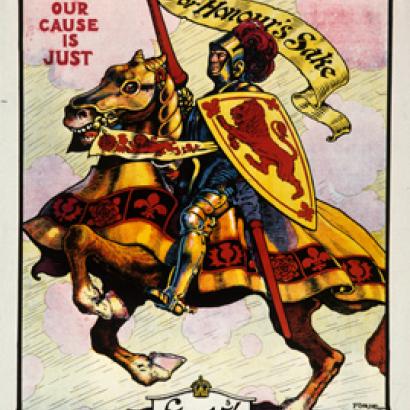- History
- Military
- Politics, Institutions, and Public Opinion

When U.S. President Donald Trump decided to intervene militarily in the Syrian civil war last week, he entered a region where it is nearly impossible to take a step without hearing the echoes of history. Civilization and war both go back a long way there.
Khan Sheikhoun, for example, the site of Syrian President Bashar al-Assad’s chemical-weapons attack, lies on an ancient site. The town is located below a tell or artificial mound with signs of settlement dating to the 20th century B.C. Around 700 B.C. those fierce warriors, the Assyrians were there. The poet Byron’s description of the Assyrians attacking their enemies “like the wolf on the fold” fits only too well the image of the innocents murdered by sarin gas.
Turning to Homs, the site of the Syrian airbase attacked by American missiles—it was known in ancient times as Emesa. A once-powerful kingdom, Emesa was annexed by the Romans and in a manner of speaking, Emesa then annexed Rome in turn. Julia Domna, daughter of the local priestly nobility, married Septimius Severus, who later became emperor. Julia Domna and her family created a dynasty that ruled Rome for 42 years.
Severus was a soldier-emperor who spent much of his reign fighting, first in civil wars and then on the frontiers from Iraq to Scotland. As empress, Julia spent so much time in war zones with her husband that she received the title, “Mother of the Camp.”
Roman empresses were a powerful lot and Julia was one of the most potent. She was brilliant, beautiful, and influential. Julia might have reacted with a wry smile to reports alleging that Ivanka Trump influenced her father’s decision to respond in force to Assad’s chemical weapons attack.
Returning to Homs, the town also lies near the splendid medieval redoubt of the Crusaders, the castle known as the Krak des Chevaliers. Crusaders held the castle for about 130 years, and then their day was done.
These are just snapshots from Syria’s long and complex military history. Perhaps they are enough to remind us that today’s events are a part of a larger story. Today’s great powers will be judged and found wanting if they do not try to stop war crimes. By the same token, it would be naïve to think that a country as complex as Syria can be settled with a few dozen missiles.















